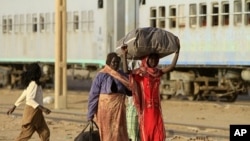As vote tabulation nears an end in southern Sudan, preliminary results indicate voters are likely to choose overwhelmingly to separate from the rest of Sudan in order to form an independent state. Whatever the outcome, southern Sudanese leaders face many challenges. One is the arrival of thousands of southern Sudanese from the north.
River barges loaded with southern Sudanese and their belongings dock regularly at the dirt embankment of Juba port.
On average, 2,000 southerners arrive each day, most of them returning home for good.
Many have lived in northern Sudan for generations, but they have family here and know their final destination. They mostly need help with transportation and food.
The government of Southern Sudan and the United Nations say most returnees arriving in Juba stay a few days and then move on to their final destinations, usually by truck.
But for some, things have not moved as quickly.
Santina Achan arrived from near Khartoum a few weeks ago with her husband and four children. They have been camping under the mango trees at the port.
She says they left because it was difficult for them in Khartoum. She says they could only survive by selling home-made alcohol (beverages) which the Islamist-leaning government does not allow.
Carlos Rogato and his family have been here since early December waiting for a truck to take them to Torit, 100 kilometers to the east. He says he left Khartoum when the authorities began razing his neighborhood for a new suburb.
He says we decided to come back and, even if we had to live under the trees, we were coming to stay.
The World Food Program is providing food aid to 120,000 returnees like Achan and Rogato.
During a food distribution on a hot day in a Juba suburb, WFP Spokesman Peter Smerdon said returnees receive food supplements as they travel.
"If they are stranded somewhere on the route, they can receive a 15-day ration from WFP," said Smerdon. "When they are traveling if they are on, say, the barges coming down [the] White Nile, they will receive high-energy biscuits because they can not cook food on board those barges because of the danger of fire."
He says when they arrive at their final destination they receive three months’ rations to help them get settled.
Smerdon believes the WFP is prepared for any major migration.
"The World Food Program is prepared for 500,000," added Smerdon. "We have pre-positioned 75,000 tons of food at 116 locations across South Sudan. That is enough food to feed one million for six months because this is in preparation both for the return and for any new displacements in the south."
He says when the rainy season begins, hopefully in March, the returning southerners will also receive seeds and more food aid to help them through the planting season.
An estimated two-million southerners have returned home since the north and the south signed a peace agreement six years ago that brought the referendum and ended 23 years of civil war.
Some say they are coming back because they have been threatened. Others fear that with separation they will be refused access to schools, health care and other public services in northern Sudan.
But many say they wanted to return home anyway to be a part of this historic moment and to enjoy peace and freedom, after what they say has been a lifetime as second-class citizens.




